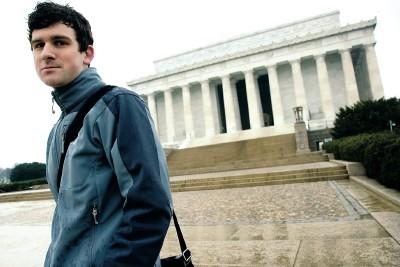
It had been a long day of herding eighth-graders in and out of museums. Navigating the District is taxing enough for a tourist, but 66 middle-schoolers can make it a headache.
I had returned to my alma mater, Davidson Academy in Nashville, to teach English and had volunteered to help chaperon the class trip to Washington.
At the same age, I’d taken the trip myself. Knowing how forgettable the DC sights had been to me then—food and girls were more memorable—I set out to prepare my three classes to appreciate the Lincoln Memorial.
I like that monument because it’s about dreaming. There, in 1963, Martin Luther King dreamed out loud, reinterpreting the vision of freedom set in motion by Abraham Lincoln. To visit the Lincoln Memorial is to visit the convergence of those dreams, to add to it your own.
In the weeks leading up to the trip, I had my classes memorize the first stanza of “O Captain! My Captain!,” Walt Whitman’s elegy about Lincoln.
O Captain! my Captain! our fearful trip is done; / The ship has weather’d every rack, the prize we sought is won . . . .
Whitman’s captain is Lincoln. The trip is the Civil War. The ship, the Union. The prize, a united country.
In the wake of Lincoln’s assassination, Whitman pictured the president as a hero whose blood is spilled at the victory banquet, as a Moses who perishes at the gates of the promised land to which he’d led his people.
I told the kids I would grade their recitation from the poem as a test and then have them recite it as a group in the memorial. More than the chance to raise their averages, I wanted to give them the memory I’d never had.
In class, most recited the poem with flair. Whether the recitation was exuberant or solemn, I could tell the words had taken root. But time has a way of robbing even fertile soil of its seeds.
When our bus pulled up at the Lincoln Memorial one night a week later, I saw in the seats behind me rows of snoozing students drained from the Holocaust Museum, knocked out by pizza and Chinese food from Union Station. Deafening beats escaped from their iPods.
I contemplated letting the moment pass. But after the bus’s tour guide finished his litany of facts, I reached for the microphone and asked the students if they’d do a run-through of the poem with me.
Silence.
If it had been lighter in the bus, the kids would have seen my cheeks redden—the kind of embarrassment that comes when a high-five is left hanging.
I asked a little louder. This time, a few headphones fell.
I started reciting to an audience of blank faces, but as we moved down the rhythmic lines—The port is near, the bells I hear, the people all exulting—more voices joined in. By the time we reached the stanza’s tragic end—But O heart! heart! heart! / O the bleeding drops of red, / Where on the deck my captain lies, / Fallen cold and dead—the bus was awake with fists and shouts.
Later, we ascended the marble steps where Dr. King had spoken. There, in the open space to the left of Lincoln, in the midst of the touring masses, as our words ricocheted off the marble walls, 66 eighth-graders got their memory.
I know I got mine.

















